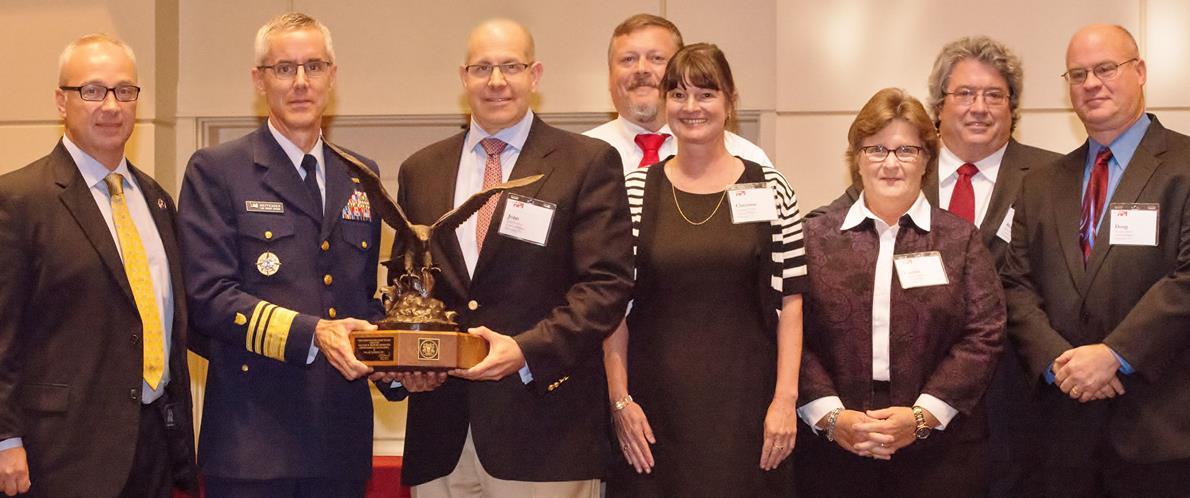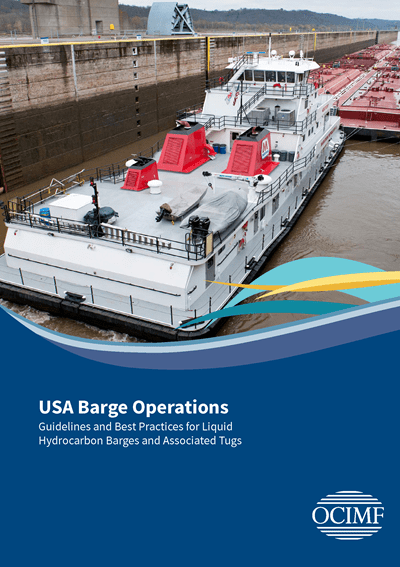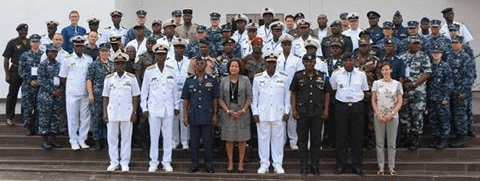"I take the opportunity to thank all those who carry out inspector audits, a difficult task which is rarely seen by many and yet underpins the integrity of the system."
Director’s Log

As July draws to a close we see the conclusion of the year's first round of committee meetings and national and international regulators moving towards a summer break.
It is a time to consolidate and progress the actions agreed and plan and prepare for the next phase.
In this months’ newsletter we feature an article on the recently published the USA Barge Operations: Guidelines and Best Practice for Liquid Hydrocarbon Barges and Associated Tugs which was published in June. I was pleased to be able to promote the guide during presentations at the recent API Tanker Conference that was held in Austin, Texas. Barge operations are very much in focus at this time both within OCIMF and the industry at large. The Ship Inspection Report Programme (SIRE) European Barge Inspection variant continues to be developed; at the 78th General Purposes Committee meeting members agreed that in many parts of the world barge operations were not meeting expected standards and options for directing efforts towards driving an improvement are currently being explored.
In Europe the organisations that collectively produce the International Safety Guide for Inland Navigation Tank-barges and Terminals (ISGINTT) recently met to discuss, among other matters, whether the time was nearing to produce a second edition. While at the API Tanker Conference I was delighted to witness John Dabbar (a member of the OCIMF Executive Committee) and his team being presented with an award for environmental excellence by the US Coastguard. John has been kind enough to provide an article for the newsletter this month and I take the opportunity to encourage all other OCIMF members to share good new stories in a similar fashion.
We also feature some SIRE news this month. The integrity and durability of the SIRE system, given its strategic importance to OCIMF member companies, is a subject often discussed. SIRE is underpinned by a number of elements that contribute to the integrity and durability of the programme but arguably the most important is the role played by inspector auditors who provide an “eyes on” and “hands on” verification, embedded within the accreditation process that inspections are being conducted thoroughly in complete alignment to the programme objectives. The annual auditor conference was held at the end of June and included increased opportunity for interaction between the auditors and the Secretariat staff who manage SIRE. The discussions are most valuable and always deliver great insights, ideas and opportunities to improve the programme. I take the opportunity to thank all those who carry out inspector audits, a difficult task which is rarely seen by many and yet underpins the integrity of the system.
Another initiative underpinning SIRE is the ability for all users to provide feedback on the inspection reports produced. It is two years since the feedback loop was created and we take the opportunity to feedback to you the members how the process is working.
I hope you enjoy the July edition of the Newsletter and if so please consider contributing articles or photographs.
Captain David Cotterell
If you have a story or a photo for next month's newsletter email This email address is being protected from spambots. You need JavaScript enabled to view it.
And the Osprey award goes to
The U.S. Coast Guard (USCG) recently recognised Polar Tankers (a subsidiary of OCIMF member ConocoPhillips) with the Rear Admiral William M. Benkert Osprey Award for Environmental Excellence.
Vice Admiral Peter Neffenger, the USCG 29th Vice Commandant, presented the award at the American Petroleum Institute Tanker Conference in Austin, Texas on the 25 June. The Benkert Awards were created to recognise outstanding achievements in marine environmental protection that go beyond mere compliance. The Osprey award is the premier environmental award in the U.S. maritime industry.
“ConocoPhillips is honoured to accept this prestigious maritime award from the U.S. Coast Guard,” said John Dabbar, Manager, Global Marine and OCIMF Executive Committee member. “Receiving the Benkert Osprey award recognises the outstanding achievement that our Polar Tankers team delivers every day through a continuous commitment to excellence in safety and environmental protection. We are proud of our employees and appreciate this recognition from the U.S. Coast Guard, which provides exemplary service to ConocoPhillips, the maritime industry and the entire nation.”

Pictured left to right:
Christopher Bulera, Manager Polar Tankers, Vice Admiral Peter Neffenger, United States Coast Guard, John Dabbar, Manager Global Marine, Vance Webb, Manager HSE and Marine CSO, Christine Rybak, Senior HSE Advisor, Connie Klusmeyer, Senior HR Business Partner Marine, Robert (Bob) Hayes, Manager Fleet Engineering, and Douglas Lamson, Manager Fleet Operations Polar Tankers.
SIRE Inspectors Auditors Conference
OCIMF hosted the eighth Ship Inspection Report Programme (SIRE) Inspectors Auditors Conference at their premises at 29 Queen Anne Gate, London on 25-26 June 2013. The conference was attended by 23 auditors from across the globe.
This year the conference was extended to one and a half days to allow more time for discussion. There were open and productive discussions on various topics relating to improving the SIRE system, including:
- The auditing process.
- Integrity of SIRE system.
- Improvement initiatives to minimise New Inspectors audit failures.
- The proposed audit plan.
OCIMF hosted the dinner on the 25 June for auditors and OCIMF SIRE team to recognise their contribution to SIRE inspector accreditation process.
SIRE updates
SIRE feedback
In the two years that the Ship Inspection Report Programme (SIRE) feedback system has been in operation 466 comments have been received, and of those 451 have been resolved.
While this is encouraging the comments came from just 13 submitting members; that means that 96% out of the 81 submitting members and 232 recipient members that could contribute have not taken the opportunity to do so.
The quality of inspection reports is paramount to maintaining the integrity and credibility of SIRE system and we would encourage participation to the feedback system to report concerns to achieve the desired continuous improvement in the report quality.
If you would like more information on the Ship Inspection Report Programme report feedback please contact This email address is being protected from spambots. You need JavaScript enabled to view it.
Vessel Incident Repository
On the 14 July 2014, OCIMF launched a new feature attached to the SIRE programme, called the Vessel Incident Repository (VIR). The VIR allows vessel operators to upload detailed reports of incidents that have taken place on board their vessels. These incident reports are then available to be viewed by anybody who has access to the SIRE database to download reports. The programme is intended to make incident reports more readily available to OCIMF Members and SIRE Recipient Members as part of their vessel screening process.
The first incident reports were uploaded within 24-hours of the system going live.
USA Barge Operations

OCIMF’s newest publication, the USA Barge Operations: Guidelines and Best Practice for Liquid Hydrocarbon Barges and Associated Tugs was published in June.
The Guide describes recommended best practices for managing and operating ocean and inland barges, towboats and tugs that carry and transport crude oil and petroleum products in bulk. The focus is on operations within the USA but much of the guidance may be relevant to barge operations in other parts of North America and in other regions.
We spoke to Chairman of the workgroup responsible, Daniel Hughey (Exxon Mobil) who told us, “The publication is offered to promote industry best practices and standards supported by OCIMF members regarding operations and safety management.”
Conceived as an update of Barge Safety (Liquefied Cargoes in Bulk) following industry advances in technology and practices, the focus moved to operations in the USA. While best practice at the barge/terminal interface is provided by ISGOTT, focused guidance on liquid hydrocarbon operations on barges also required specific guidance which is now provided by this guide.
USA Barge Operations: Guidelines and Best Practice for Liquid Hydrocarbon Barges and Associated Tugs
$25
Planning Conference for Obangame Express 2015
Fiona Rider, the Project Support Officer for the Maritime Trade Information Sharing Centre – Gulf of Guinea (MTISC-GoG), attending the Initial Planning Conference in Accra Ghana for Obangame Express 2015 (OE15).
OE15 is part of the NAVAF Express series of exercises that are designed to develop the capability of Maritime Operation Centres (MOC) across the Gulf of Guinea region.
Typically the MOCs are run by individual nation’s navies. Focusing on the Gulf of Guinea the Aim of the multilateral fleet training exercise is to enhance Regional Maritime Domain Awareness (MDA), information sharing and interoperability with participating coalition parties. MTISC played a supporting role in OE14 (see April’s edition of the newsletter) and now MTISC is established and operational it aims to play a much more prominent role for OE15.

